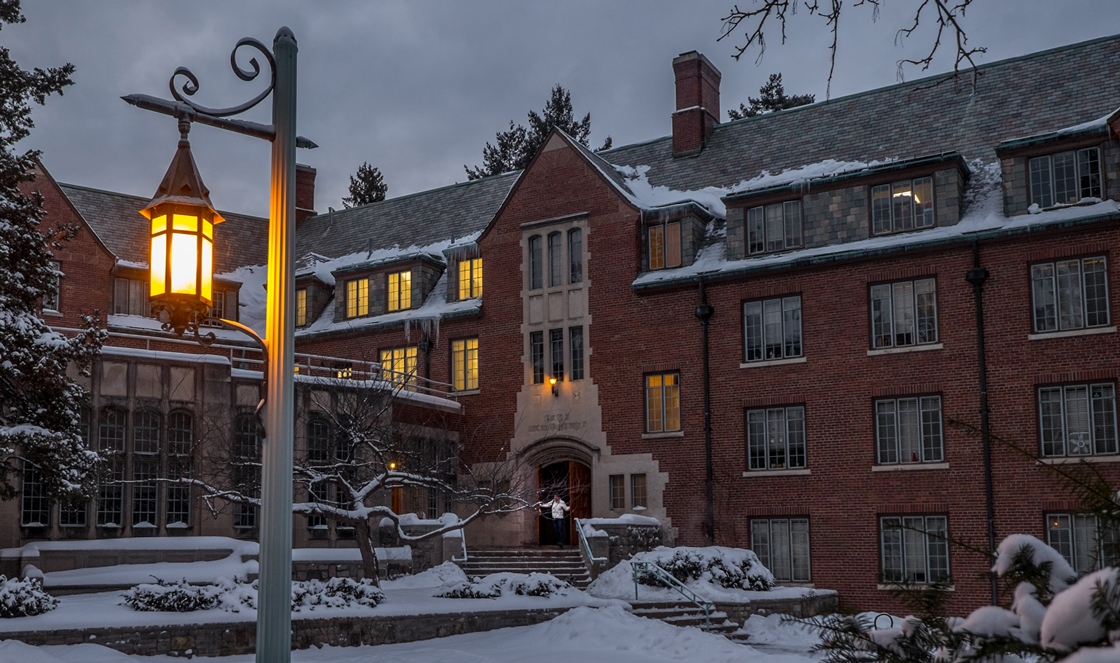November 2013
Caroline Smith, Kelly Dumais, and Remco Bredewold presented posters at the annual meeting of the Society for Neuroscience which took place in San Diego, CA. Fourth photo depicts sunset over the convention center.
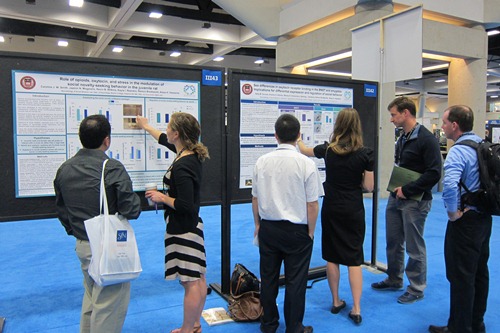
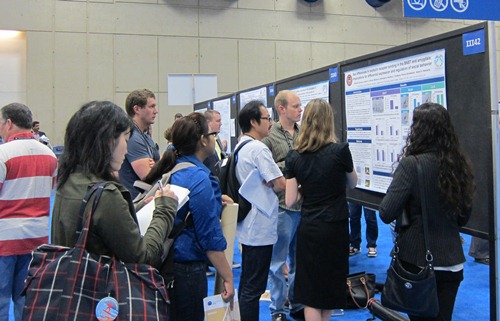
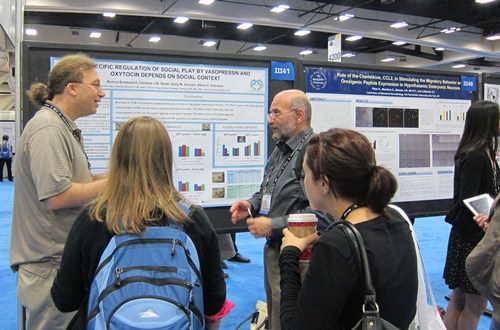

October 2013
Andrea Alonso, Christine Wu, Jennifer Schiavo, Kevin Wilkins, Caroline Smith, and Kelly Dumais presented posters at the Annual Symposium of the Center for Neuroendocrine Studies at UMass Amherst.
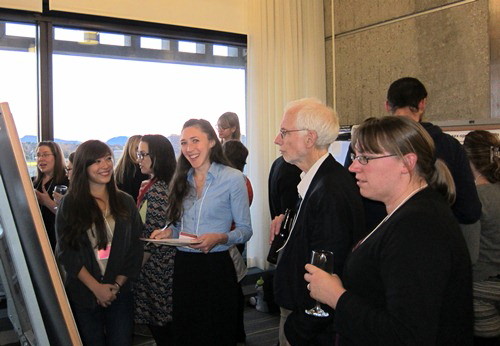
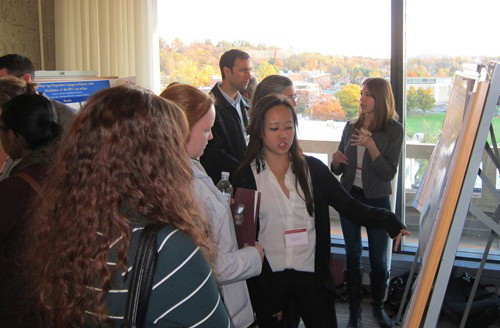
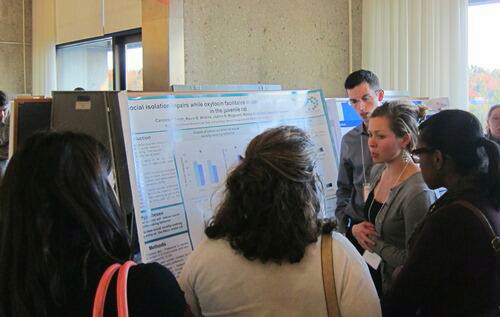
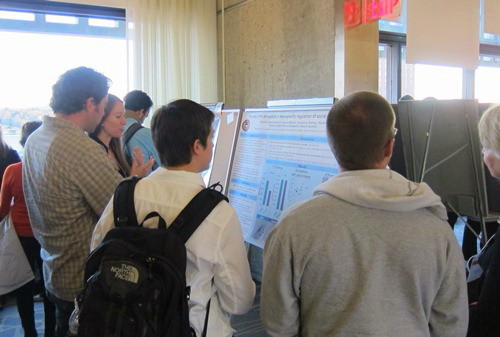
October 2013
Kelly Dumais got her first first-author paper entitled “Sex differences in oxytocin receptor binding in forebrain regions: Correlations with social interest in brain region- and sex-specific ways” published in the journal Hormones and Behavior!! She and co-authors Remco Bredewold, Thomas Mayer (class ’12), and Alexa Veenema found that female rats have significantly less oxytocin receptor binding densities than male rats in the majority of forebrain regions analyzed. This is an important finding because oxytocin is still considered as being more important for females than for males. Our findings suggest that this may not be the case. Furthermore, Kelly found that female rats spent much less time investigating novel rats than male rats do, suggesting that females show lower social interest than males. This low social interest in females correlated negatively with oxytocin receptor binding density in the central amygdala, an area involved in anxiety-related behaviors. In contrast, high social interest in males correlated positively with oxytocin receptor binding in the medial amygdala, an area involved in social behavior. These sex-specific correlations may be implicated in a neural circuitry regulating low (females) versus high (males) social interest. Kelly is currently testing this hypothesis. This research was supported by institutional funding provided by Boston College.
September 2013
 Kelly Dumais received a highly competitive Ruth L. Kirschstein National Research Service Award (NRSA). Kelly’s research focuses on the neurobiological basis of sex-specific regulation of social behavior. This 2-year award allows her to employ a unique combination of techniques (including in vivo microdialysis and fMRI) to examine the role of oxytocin and its underlying neural circuits in mediating social interest in a rat model. Congrats Kelly!!
Kelly Dumais received a highly competitive Ruth L. Kirschstein National Research Service Award (NRSA). Kelly’s research focuses on the neurobiological basis of sex-specific regulation of social behavior. This 2-year award allows her to employ a unique combination of techniques (including in vivo microdialysis and fMRI) to examine the role of oxytocin and its underlying neural circuits in mediating social interest in a rat model. Congrats Kelly!!
September 2013
 Alexa Veenema received the NSF Faculty Early Career Development (CAREER) Program award!! This award is given to promising young faculty members who exemplify the role of teacher-scholar through outstanding research, excellent education and the integration of both education and research. This award will support research over a five-year period in which Alexa aims to advance the understanding of the sex-specific neurobiological regulation of social behaviors in the juvenile period. Alexa’s award is highlighted in BC Chronicle.
Alexa Veenema received the NSF Faculty Early Career Development (CAREER) Program award!! This award is given to promising young faculty members who exemplify the role of teacher-scholar through outstanding research, excellent education and the integration of both education and research. This award will support research over a five-year period in which Alexa aims to advance the understanding of the sex-specific neurobiological regulation of social behaviors in the juvenile period. Alexa’s award is highlighted in BC Chronicle.
July 2013
Research article: Sex-specific modulation of juvenile social play by vasopressin. Alexa Veenema, Remco Bredewold, and Geert de Vries published a paper in the Journal Psychoneuroendocrinology in which they showed that the neuropeptide vasopressin modulates the display of social play behavior in juvenile male and female rats in opposite ways. These findings are important because social play interactions among juveniles are critical for the development of social competence and little is known about the regulation of social play. The brain vasopressin system is sexually dimorphic, with males producing more vasopressin than females, suggesting that vasopressin might be more important for the regulation of social play behavior in males than in females. The current findings disprove this by demonstrating that despite this sex difference in vasopressin synthesis, vasopressin is equally important for the regulation of social play behavior in males and in females, but that it modulates social play in males and females in opposite directions. A next step will be to find out how vasopressin modulates social play in sex-specific ways by studying potential sex differences in the underlying neural circuitry. This research was funded by the German Research Foundation (VE453/4-1) and the Brain and Behavior Research Foundation (17382) to Alexa and NSF (IBN-9421658) and NIMH (RO1-MH047538) to Geert.
July 2013
Alexa gave a talk about the ongoing research in the lab at the Summer Science Institute for High School/Middle School Science teachers which is run through The Education Cooperative. This week long summer program (July 11-15) aims to inform Science teachers about the latest developments in various fields of science.
July 2013
Caroline successfully defended her Master of Science Thesis on July 1st. On the photo, Caroline and the Promotion Committee consisting of Profs. Gorica Petrovich, Sara Cordes, and Alexa Veenema.
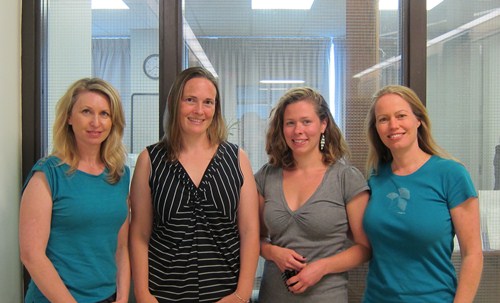
June 2013
Kelly Dumais, Caroline Smith, and Remco Bredewold presented posters on their research projects (see photos below), and Alexa Veenema gave a talk (title: key roles for vasopressin and oxytocin in sex-specific regulation of juvenile social behaviors) at the annual meeting of the Society for Behavioral Neuroendocrinology, which took place in Atlanta on June 23-26.
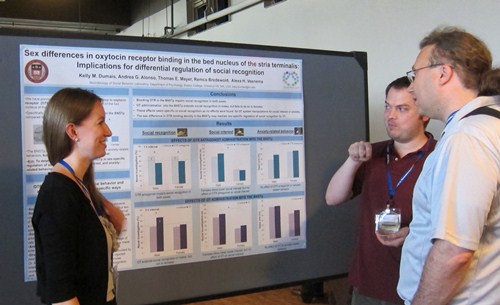
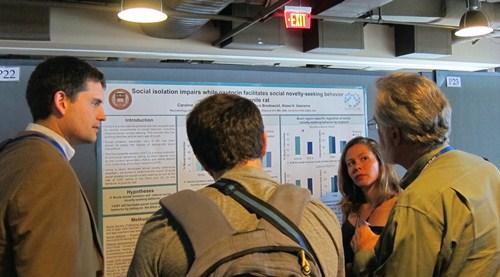
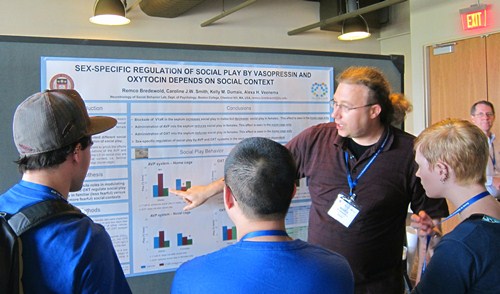
June 2013
Andrea Alonso, Marisa Immormino, Sterling Karalula, Jennifer Schiavo, Kevin Wilkins, and Christine Wu received competitive BC Undergraduate Research Fellowships, which will allow them to do full-time research over the summer in preparation for their senior research thesis.
May 2013
Alexa Veenema gave a talk at a symposium on “Oxytocin and Emotional Dysregulation: Translating Basic Research Into Clinical Science” as part of the annual meeting of the Society of Biological Psychiatry which will take place on May 16-18 in San Francisco.
May 2013
Andrea Alonso, Marisa Immormino, Sterling Karakula, Jazmin Mogavero, and Christine Wu presented posters on their research projects at the annual Psychology Undergraduate Research Symposium which took place at Boston College on May 3.
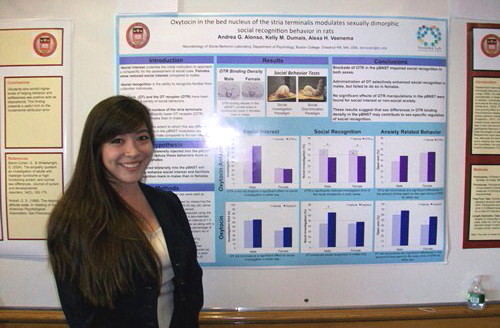
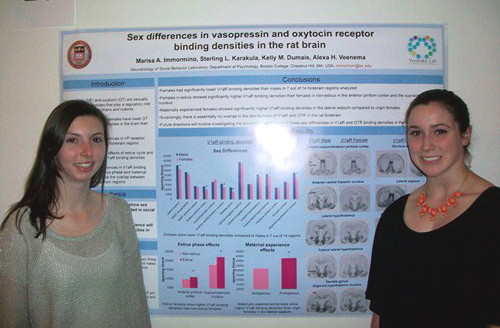
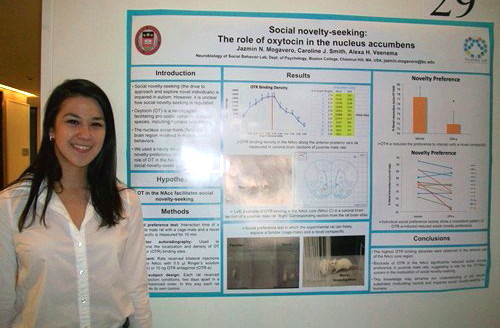
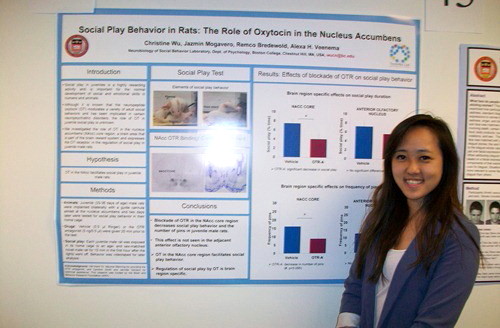
March 2013
Alexa Veenema gave a talk at a symposium on “The Social Brain in a Dynamic Social Environment” that is organized in honor of the retirement of Prof. Jaap Koolhaas, PhD advisor of Alexa Veenema, which takes place on March 22, in Groningen, the Netherlands.
February 2013
Alexa participated at Boston College’s Women in Science and Technology Program. This program brings high school girls to campus to expose them to scientific research.
January 2013
Alexa Veenema will gave a talk at the 2013 Social Neuroendocrinology Pre-conference on January 17, in New Orleans.
